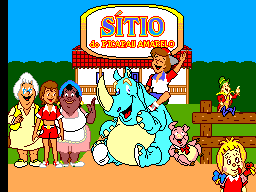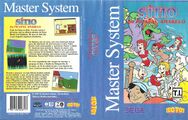Difference between revisions of "Sítio do Picapau Amarelo"
From Sega Retro
SEGAAA2004 (talk | contribs) |
|||
| (4 intermediate revisions by 3 users not shown) | |||
| Line 3: | Line 3: | ||
| publisher=[[Tec Toy]] | | publisher=[[Tec Toy]] | ||
| developer=[[Tec Toy]] | | developer=[[Tec Toy]] | ||
| + | | licensor= H. Monteiro Lobato, Ely Barbosa | ||
| system=[[Sega Master System]] | | system=[[Sega Master System]] | ||
| sounddriver= | | sounddriver= | ||
| Line 12: | Line 13: | ||
| sms_date_br=1998-08 | | sms_date_br=1998-08 | ||
| sms_code_br=028710 | | sms_code_br=028710 | ||
| + | | sms_rating_br=ti | ||
}} | }} | ||
| − | |||
}} | }} | ||
| − | {{stub}}'''''{{PAGENAME}}''''' is a platform game developed and published by [[Tec Toy]] for the [[Sega Master System]], released exclusively in Brazil. The game is based on the Brazilian [ | + | {{stub}}'''''{{PAGENAME}}''''' is a platform game developed and published by [[Tec Toy]] for the [[Sega Master System]], released exclusively in Brazil. The game is based on the Brazilian [[wikipedia:Sítio do Picapau Amarelo (novel series)|novel series of the same name]], which is commonly considered equivalent to "The Wonderful Wizard of Oz"' series for the Brazilian audience. |
Tectoy bet on the popularity of the series hoping to catch more attention of the infantile audience, similar to what they had previously done with ''[[Mônica no Castelo do Dragão]]'' and its "sequels", although their plan wasn't successful this time, mainly because it was released when the console was in a big decline, losing market to several other consoles. | Tectoy bet on the popularity of the series hoping to catch more attention of the infantile audience, similar to what they had previously done with ''[[Mônica no Castelo do Dragão]]'' and its "sequels", although their plan wasn't successful this time, mainly because it was released when the console was in a big decline, losing market to several other consoles. | ||
| Line 60: | Line 61: | ||
==Production credits== | ==Production credits== | ||
| + | {{multicol| | ||
{{creditstable| | {{creditstable| | ||
| − | + | *'''{{rolloverText|Roteiro|Storyline by}}:''' Edson Takeshi Nakaya, {{rolloverText|Familia Lobato|Lobato Family}} | |
| − | *'''Storyline by:''' Edson Takeshi Nakaya, Lobato Family | + | *'''{{rolloverText|Design do Jogo|Game Design}}:''' Edson Takeshi Nakaya |
| − | *'''Game Design:''' Edson Takeshi Nakaya | + | *'''{{rolloverText|Coordenador e Gerente de Programação|Coordinator and Programming Manager}}:''' Heriberto Manrique |
| − | *'''Coordinator and Programming Manager:''' Heriberto Manrique | + | *'''{{rolloverText|Programadores|Programmers}}:''' Elielson Salaro, Luis Carlos Ferreira |
| − | *'''Programmers:''' Elielson Salaro, Luis Carlos Ferreira | + | *'''{{rolloverText|Gerente de Mkt/Desenvolv. de Novos Negócios|Marketing Manager/New Business Development}}:''' Vivien Navarro |
| − | *'''Marketing Manager/New Business Development:''' Vivien Navarro | + | *'''Designers:''' Daniel Trevisan, Edson Takeshi Nakaya, Melissa Lotfi Hollo |
| − | *''' | + | *'''{{rolloverText|Gerente de Grupo/Marketing Videogames|Group Manager/Videogames Marketing}}:''' Andrea Bedricovetchi |
| − | *'''Group Manager/Videogames Marketing:''' Andrea Bedricovetchi | + | *'''{{rolloverText|Gerente de Produto|Product Manager}}:''' Paulo Montini |
| − | *'''Product Manager:''' Paulo Montini | + | *'''{{rolloverText|Assistente de Produto|Product Assistant}}:''' Denise Ortiz Miotto |
| − | *'''Product Assistant:''' Denise Ortiz Miotto | + | *'''{{rolloverText|Músicas, Sons e Efeitos|Music and Sound Effects}}:''' Silvio Mario B. Depieri |
| − | *'''Music and Sound Effects:''' Silvio Mario B. Depieri | + | *'''{{rolloverText|Agradecimentos|Special Thanks to}}:''' Duda "Lobatologa" Mattos, {{rolloverText|Joyce Lobato e Jorge Kornbluh|Joyce Lobato and Jorge Kornbluh}}, Alvaro Gomes |
| − | *'''Special Thanks to:''' Duda "Lobatologa" Mattos, Joyce Lobato and Jorge Kornbluh, Alvaro Gomes | + | | source=In-game credits |
| + | | console=SMS | ||
}} | }} | ||
| − | |||
}} | }} | ||
Latest revision as of 16:34, 29 December 2023
| Sítio do Picapau Amarelo | ||||||||||
|---|---|---|---|---|---|---|---|---|---|---|
| System(s): Sega Master System | ||||||||||
| Publisher: Tec Toy | ||||||||||
| Developer: Tec Toy | ||||||||||
| Licensor: H. Monteiro Lobato, Ely Barbosa | ||||||||||
| Genre: Action | ||||||||||
| Number of players: 1-2 (alternating) | ||||||||||
| Official in-game languages: | ||||||||||
|
This short article is in need of work. You can help Sega Retro by adding to it.
Sítio do Picapau Amarelo is a platform game developed and published by Tec Toy for the Sega Master System, released exclusively in Brazil. The game is based on the Brazilian novel series of the same name, which is commonly considered equivalent to "The Wonderful Wizard of Oz"' series for the Brazilian audience.
Tectoy bet on the popularity of the series hoping to catch more attention of the infantile audience, similar to what they had previously done with Mônica no Castelo do Dragão and its "sequels", although their plan wasn't successful this time, mainly because it was released when the console was in a big decline, losing market to several other consoles.
Contents
Story
Everything was going fine in the farm until Tia Nastácia fell asleep due to a mysterious sickness. After Dr. Caramujo examined her, he told that there an antidote for this. But the problem is the fact that the ingredients are difficult to get. Pedrinho and Emília decided to find them.
Gameplay
In Sítio do Picapau Amarelo you control either Pedrinho or Emília and two players can play alternating, although they have to share the controller connected to port 1. It's a very simple platform game on which ![]() attacks and
attacks and ![]() jumps; pressing
jumps; pressing ![]() or
or ![]() twice, then holding it, causes the character to run.
twice, then holding it, causes the character to run.
Some enemies cannot be damaged, like marimbondos (wasps), while others can be damaged by jumping on top of them, like in a typical Master System platform game. Curiously the second stage is completely different depending on the character chosen.
Items
- Ninho com ovos (nest with eggs)
- Vidas extras (extra life)
- Pássaros engaiolados (caged birds)
- Gota de sangue do morcego gigante
- 6 aranhas pequenas (6 small spiders)
- Carapuça do Saci (Saci's carapuça)
- Bastão de japecanga do Curupira (Curupira's japecanga stick)
- Fio de cabelo da Iara (Iara's strand of hair)
- Lágrima da Cuca (Cuca's tear)
Enemies
- Morcego (Bat)
- Marimbondo (Wasp)
- Redemoinho (Swirl)
- Cobra (Snake)
- Aranha (Spider)
- Piranha
- Armadilha de caçador (Hunter's trap)
- Gavião (Hawk)
- Onça (Brazilian jaguar)
- Macaco (Monkey)
- Madeireiro (Lumberjack)
- Caçador (Hunter)
Stages
- Stage 1 - Sangue de morcego
- Stage 2 - Carapuça do Saci
- Stage 3 - Bastão de salsaparrilha do Curupira
- Stage 4 - Fio de cabelo da Iara / Lágrima da Cuca
Production credits
- Roteiro: Edson Takeshi Nakaya, Familia Lobato
- Design do Jogo: Edson Takeshi Nakaya
- Coordenador e Gerente de Programação: Heriberto Manrique
- Programadores: Elielson Salaro, Luis Carlos Ferreira
- Gerente de Mkt/Desenvolv. de Novos Negócios: Vivien Navarro
- Designers: Daniel Trevisan, Edson Takeshi Nakaya, Melissa Lotfi Hollo
- Gerente de Grupo/Marketing Videogames: Andrea Bedricovetchi
- Gerente de Produto: Paulo Montini
- Assistente de Produto: Denise Ortiz Miotto
- Músicas, Sons e Efeitos: Silvio Mario B. Depieri
- Agradecimentos: Duda "Lobatologa" Mattos, Joyce Lobato e Jorge Kornbluh, Alvaro Gomes
Physical scans
Technical information
ROM dump status
| System | Hash | Size | Build Date | Source | Comments | |||||||||
|---|---|---|---|---|---|---|---|---|---|---|---|---|---|---|
| ? |
|
1MB | Cartridge (BR) |
References


